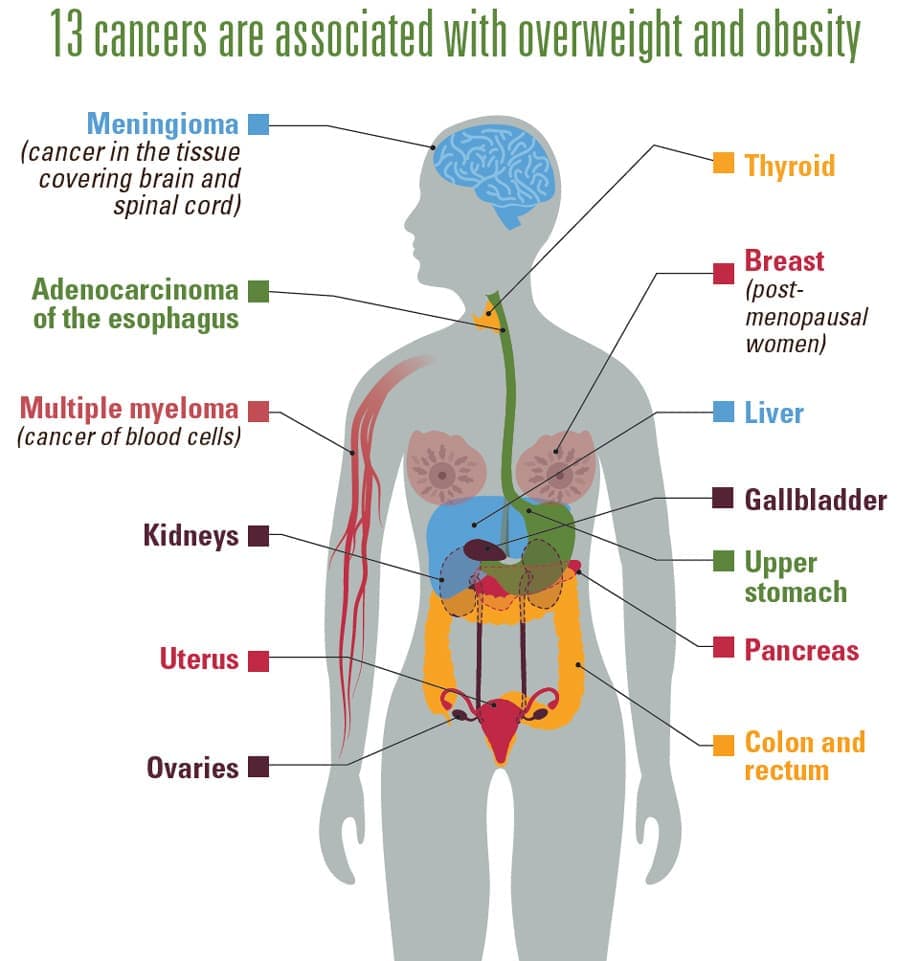Obesity and Cancer
Being overweight or having obesity increases your risk of getting cancer.
You may be surprised to learn that being overweight or having obesity are linked with a higher risk of getting 13 types of cancer. These cancers make up 40% of all cancers diagnosed in the United States each year.
Many things are associated with cancer, but avoiding tobacco use and keeping a healthy weight are two of the most important steps you can take to lower your risk of getting cancer.
What Is Overweight and Obesity?
Weight that is higher than what is considered a healthy weight for a given height is called overweight or obesity.
Body mass index (BMI) is used as a screening tool for overweight and obesity. For adults, a person with a BMI from 25.0 to 29.9 is considered overweight. A person with a BMI that is 30.0 or higher has obesity.
For children and teens, BMI is calculated the same way, but interpreted in a different way. BMI for children is often compared to the average BMI of other children in the same age range.
Which Cancers Are Related to Obesity?
Being overweight or having obesity are linked with a higher risk of getting 13 kinds of cancer—
- Adenocarcinoma of the esophagus.
- Breast (in women who have gone through menopause).
- Colon and rectum.
- Uterus.
- Gallbladder.
- Upper stomach.
- Kidneys.
- Liver.
- Ovaries.
- Pancreas.
- Thyroid.
- Meningioma (a type of brain cancer).
- Multiple myeloma.
Being overweight or having obesity doesn’t mean that someone will definitely get cancer. But it does mean that they are more likely to get cancer than if they kept a healthy weight.
How Can Obesity Cause Cancer?
Overweight and obesity can cause changes in the body including long-lasting inflammation and higher than normal levels of insulin, insulin-like growth factor, and sex hormones. These changes may lead to cancer. The risk of cancer increases with the more excess weight a person gains and the longer a person is overweight.
How Can I Lower My Risk?
You can achieve a healthy weight by making healthy lifestyle choices. You can reduce your risk of obesity-related cancer by following a healthy eating plan and getting regular physical activity.
How Can Doctors Help Their Patients Keep a Healthy Weight?
Health care providers can help patients keep a healthy weight in several ways. For example, they can—
- Measure patients’ weight, height, and BMI.
- Explain that keeping a healthy weight can lower a person’s cancer risk.
- Connect patients and families with community services that provide healthy food and ways to be active.
- Encourage adult patients to participate in behavioral interventions recommended by the U.S. Preventive Services Task Force. These interventions are designed to help patients lose 5% or more of their weight through dietary changes and increased physical activity.
- Screen for obesity in children and teens who are 6 years old or older. If needed, refer them to behavioral interventions to help them lose weight.
How Many People Have Obesity or Cancers Linked to Obesity?
Many people in the United States have obesity. Recent surveys have found that about 42% of adults and about 20% of children and adolescents have obesity. Adults with obesity have a higher risk of many serious diseases and health conditions, including cancer, than people with a healthy weight.
From 2005 to 2014, most cancers associated with overweight and obesity increased in the United States, while cancers associated with other factors decreased. During this time, the rate of new cancers associated with overweight and obesity (except colorectal cancer) increased 7%, while the rate of new cancers not associated with overweight and obesity dropped 13%. (The rate of new cases of colorectal cancer dropped 23% during this time. Screening tests can prevent this cancer.)
The Data Visualizations tool provides data on the rates of new obesity-associated cancers among males and females in the United States. For example—
- More than 684,000 obesity-associated cancers occur in the United States each year, including more than 210,000 among men and 470,000 among women.
- Breast cancer after menopause is the most common obesity-associated cancer among women. Colorectal cancer is the most common obesity-associated cancer among men.
- More than 90% of new obesity-related cancers occur in men and women who are 50 years old or older.
- Obesity and Cancer (National Cancer Institute)
- Does Body Weight Affect Cancer Risk? (American Cancer Society)

